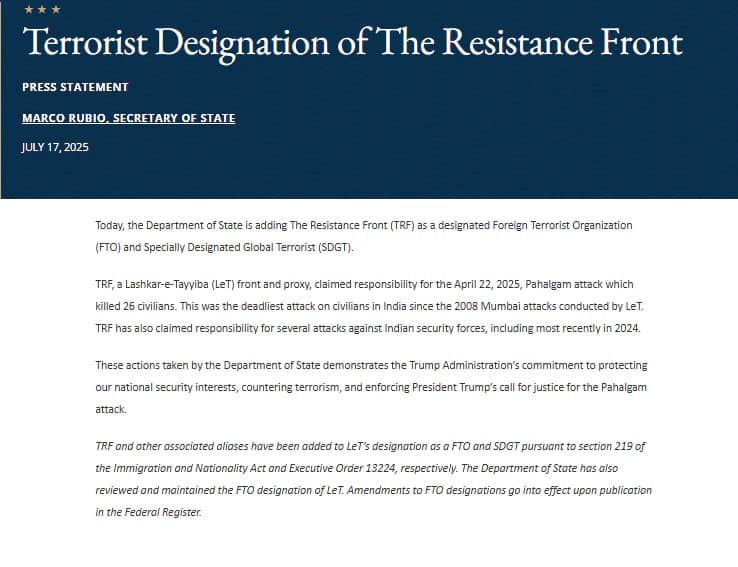
The United States on Thursday formally designated The Resistance Front (TRF), a proxy of the Pakistan-based Lashkar-e-Taiba (LeT)—as a Foreign Terrorist Organisation (FTO) and Specially Designated Global Terrorist (SDGT). The move comes in direct response to the April 22 Pahalgam terror attack, which killed 26 civilians in Jammu and Kashmir.
In a statement, US Secretary of State Marco Rubio said the TRF was being added to the list of global terror groups under Section 219 of the Immigration and Nationality Act and Executive Order 13224. The designation will take effect upon publication in the Federal Register.
“TRF, a Lashkar-e-Taiba front, claimed responsibility for the Pahalgam attack, the deadliest against civilians in India since the 2008 Mumbai attacks,” Rubio said. “This move reflects the Trump administration’s clear commitment to holding terrorists and their backers accountable.”

What is TRF and why the US acted
TRF, which also goes by the name Kashmir Resistance, had initially claimed the Pahalgam attack but later denied involvement. Indian security agencies have long linked the group to Lashkar-e-Taiba, a banned outfit responsible for numerous deadly attacks, including 26/11.
The US has now grouped TRF under the same FTO and SDGT designation as Lashkar-e-Taiba. That means tougher global sanctions, asset freezes, and penalties for those aiding or abetting the group.
“The group has also been behind several attacks on Indian security forces in the past year,” the US statement added.
April 22: The Pahalgam attack that sparked global outrage
The terror attack in Baisaran Valley, Pahalgam targeted Hindu civilians. Eyewitnesses said four armed men stormed the valley and opened fire after verifying the religion of their victims.
India said the attack was clearly designed to derail Kashmir’s tourism economy and stoke communal tensions.
The United Nations Security Council had condemned the attack, urging member nations to hold the perpetrators and their financiers accountable.
India retaliates with Operation Sindoor
India’s military response was swift and forceful. On May 7, the Indian Air Force launched Operation Sindoor, targeting terror camps across the border in Pakistan and Pakistan-occupied Kashmir (PoK). One of the key targets was the Noor Khan airbase in Rawalpindi.
Pakistani military assets were reportedly damaged. In retaliation, Pakistan resorted to repeated ceasefire violations along the Line of Control (LoC) and the international border.
Ceasefire talks: Trump claims credit, India disagrees
On May 10, hostilities ceased after Pakistan’s military reached out directly to Indian counterparts. However, US President Donald Trump claimed on his social media platform that the ceasefire was a result of his intervention and threats to suspend trade talks.
India dismissed the claim, saying it was a result of direct military-to-military communication and reiterated its consistent position: No third-party mediation on India-Pakistan matters.
Jaishankar: TRF tried to divide India, we hit back
Speaking at the Shanghai Cooperation Organisation (SCO) foreign ministers’ meeting in Tianjin, External Affairs Minister S Jaishankar said India had taken a firm stance against terrorism, extremism, and separatism, calling them the “three evils.”
“The Pahalgam attack was designed to disrupt peace and divide communities,” Jaishankar said. “The UN Security Council condemned it, and India has acted to bring the perpetrators to justice. The SCO must also remain firm against such threats.”
Discover the latest Business News, Sensex, and Nifty updates. Obtain Personal Finance insights, tax queries, and expert opinions on Moneycontrol or download the Moneycontrol App to stay updated!
Find the best of Al News in one place, specially curated for you every weekend.
Stay on top of the latest tech trends and biggest startup news.